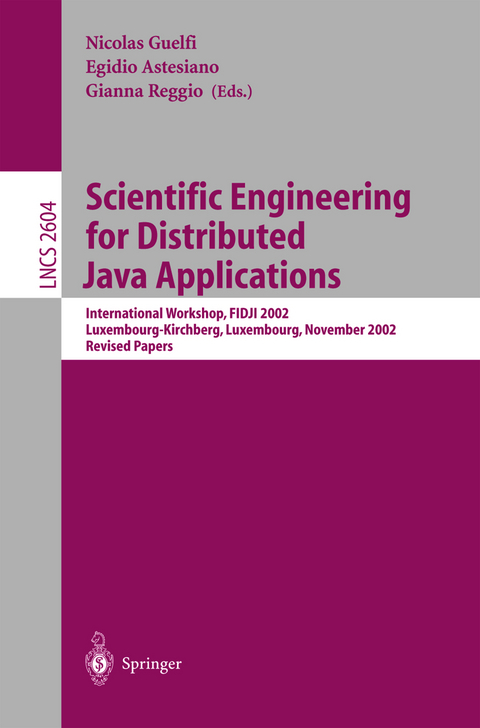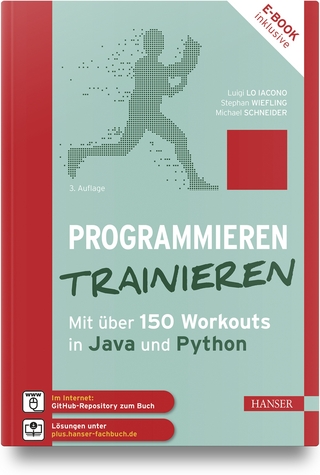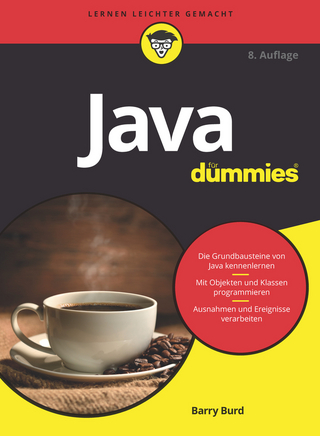
Scientific Engineering for Distributed Java Applications
Springer Berlin (Verlag)
978-3-540-00679-4 (ISBN)
A Java Coordination Tool for Web-Service Architectures: The Location-Based Service Context.- A Java Coordination Tool for Web-Service Architectures: The Location-Based Service Context.- Auction System Design Using Open Multithreaded Transactions.- Critical Evaluation of the EJB Transaction Model.- Automated Prototyping of CORBA-Based Distributed Object-Oriented Systems.- Automated Prototyping of CORBA-Based Distributed Object-Oriented Systems.- Jawa: A Java Tool-Kit for Mobile Objects Applications.- Jawa: A Java Tool-Kit for Mobile Objects Applications.- Performance Analysis of Java Group Toolkits: A Case Study.- Performance Analysis of Java Group Toolkits: A Case Study.- A Java-Based, System for Collaborative Design and Manufacturing.- A Java-Based, System for Collaborative Design and Manufacturing.- Structured Handling of Online Interface Upgrades in Integrating Dependable Systems of Systems.- Structured Handling of Online Interface Upgrades in Integrating Dependable Systems of Systems.- An Experience in Architectural Extensions: Active Objects in J2EE.- An Experience in Architectural Extensions: Active Objects in J2EE.- Generating application development environments for Java frameworks.- Generating Pattern-Based Web Tutorials for Java Frameworks.- A framework to dynamically manage distributed virtual environments. Virtual Worlds.- Massively Distributed Virtual Worlds: A Framework Approach MaDViWorld: A Java Software Framework for Massively Distributed Virtual Worlds.- Distributed Java Platform with Programmable MIMD Capabilities.- Distributed Java Platform with Programmable MIMD Capabilities.- JGrid: Exploiting Jini for the Development of Grid Applications.- JGrid: Exploiting Jini for the Development of Grid Applications.- The EVOLVE Project: Component-Based Tailorability for CSCW Applications.- Managing Dependencies in Component-Based Distributed Applications.- JTN:A Java-Targeted Graphical Formal Notations for Reactive and Concurrent Systems.- A Notation for Component-Based Design of Java Applications.- On Building Testable Software Components.- WCT: A Wrapper for Component Testing.- Jada-Coordination and Communication for Java Agents.- A Java Middleware for Guaranteeing Privacy of Distributed Tuple Spaces.- Keynote Talks.- Designing Fault-Tolerant Mobile Systems.- The Role of OCL in the Model Driven Architecture.- Tutorials.- Requirements Elicitation with Use Cases.- Java Threads Can Be Very Useful Building Blocks.
| Erscheint lt. Verlag | 25.2.2003 |
|---|---|
| Reihe/Serie | Lecture Notes in Computer Science |
| Zusatzinfo | X, 206 p. |
| Verlagsort | Berlin |
| Sprache | englisch |
| Maße | 152 x 229 mm |
| Gewicht | 318 g |
| Themenwelt | Mathematik / Informatik ► Informatik ► Netzwerke |
| Informatik ► Programmiersprachen / -werkzeuge ► Java | |
| Mathematik / Informatik ► Informatik ► Software Entwicklung | |
| Informatik ► Theorie / Studium ► Künstliche Intelligenz / Robotik | |
| Schlagworte | component-based systems development • CORBA • Design Patterns • distributed applications • Distributed Objects • Distributed Systems • DJ • Framework • Hardcover, Softcover / Informatik, EDV/Informatik • HC/Informatik, EDV/Informatik • HC/Informatik, EDV/Programmiersprachen • Java • java applications • Java EE • Middleware • Mobile Agents • Mobile Code • Mobile Object Systems • Modeling • Software Architectures • UML • Web Services |
| ISBN-10 | 3-540-00679-6 / 3540006796 |
| ISBN-13 | 978-3-540-00679-4 / 9783540006794 |
| Zustand | Neuware |
| Haben Sie eine Frage zum Produkt? |
aus dem Bereich


